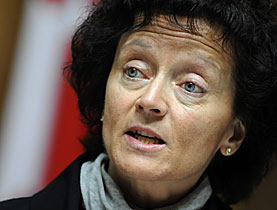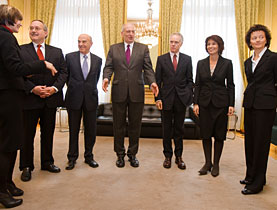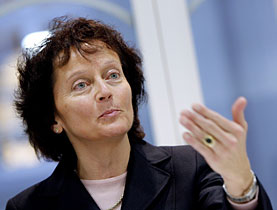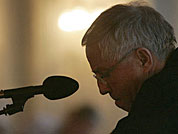Minister rejects demands to step down

The government and main political parties have condemned an attempt by the rightwing Swiss People's Party to remove Justice Minister Eveline Widmer-Schlumpf.
On Thursday Widmer-Schlumpf rejected an ultimatum from the People’s Party leadership to leave the party or be pushed.
She was warned on Wednesday that if she failed to comply by a deadline of April 11, the leadership would instruct the branch of the party in her home canton of Graubünden to expel her.
“I will not let myself be intimidated. I will stick this out,” she said at a media conference in Bern.
Widmer-Schlumpf replaced the party’s controversial representative, Christoph Blocher, in the government last December. She was elected to the cabinet by parliament as a whole, against the wishes of the People’s Party.
The People’s Party justified its intention to expel Widmer-Schlumpf by saying she had pushed Blocher from office and “placed her personal interest and that of the [centre-left] Social Democratic Party above the interests of her own party”.
Widmer-Schlumpf, who has been a party member for three decades and whose father was also a People’s Party minister, on Thursday denied the election result had been rigged.
“Witch-hunt”
On Thursday Foreign Minister Micheline Calmy-Rey said the government stood right behind Widmer-Schlumpf and that the People’s Party’s behaviour was “unacceptable”, pointing out that Widmer-Schlumpf had been democratically elected by parliament.
“It is not for one party to choose a government minister,” Calmy-Rey said.
All the main political groups – the Social Democrats, the Radicals, the Christian Democrats and the Greens – also strongly condemned the People’s Party, unanimously saying the attempt to remove Widmer-Schlumpf was “unworthy” of a democracy.
Christophe Darbellay, president of the centre-right Christian Democrats, spoke of a “witch-hunt” and said the People’s Party’s methods “had previously only been seen in totalitarian states”.
People’s Party delegates are widely expected to confirm the policy of the party leadership at a national meeting on Saturday.
“Ugly element”
Andreas Ladner, political scientist at the Lausanne Graduate Institute of Public Administration, saw no reason why Widmer-Schlumpf could not continue as justice minister even were she to be expelled from her party.
She could carry out her cabinet mandate as an independent, he said.
Ladner added that he could understand what the People’s Party was doing, since a political party had to ensure that its members toed the party line, but he detected an “ugly element” to the attempts to remove Widmer-Schlumpf, namely holding the cantonal chapter hostage.
Only cantonal sections can expel party members, which is why the leadership of the national party is putting pressure on the entire Graubünden section of the People’s Party to remove Widmer-Schlumpf.
Her cantonal branch has described the ultimatum as “unacceptable”.
No cabinet minister has ever been expelled from a Swiss political party, but several members of cantonal and communal governments have been removed.
The party to have struck off the most members is the centre-left Social Democrats, for reasons ranging from unofficial party candidates beating official ones to supporting candidates from other parties.
swissinfo with agencies
The four main political parties have been represented in the seven-member Swiss government for nearly 50 years.
The party-political make up remained unchanged between 1959 and 2003, when Christoph Blocher won a second seat for his party at the expense of the centre-right Christian Democrats.
The four main parties have an 80% majority in parliament, while the Greens are the largest opposition party with around 10%.
Over the past 15 years the People’s Party has gradually increased its share of the vote to 29% in October’s parliamentary elections.
Christoph Blocher was only the fourth cabinet minister in Swiss history to fail to win re-election.
Usually it’s up to a cabinet minister to choose the moment to step down. Ministers are elected for a four-year term by parliament.
Eveline Widmer-Schlumpf became the third woman in the cabinet, joining Foreign Minister Micheline Calmy-Rey and Economics Minister Doris Leuthard.

In compliance with the JTI standards
More: SWI swissinfo.ch certified by the Journalism Trust Initiative




You can find an overview of ongoing debates with our journalists here. Please join us!
If you want to start a conversation about a topic raised in this article or want to report factual errors, email us at english@swissinfo.ch.